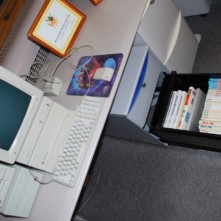A computer history museum returns to Boston
| September 2nd, 2013 6:41 PM by Ken Gagne | Filed under History, Mainstream coverage; Comments Off on A computer history museum returns to Boston |
Eight years ago, I took Ryan Suenaga to the Boston Museum of Science, whose "ComputerPlace" exhibit featured an Apple II with a copy of VisiCalc. Although exciting to see, this one display was the extent of Boston’s preservation of computer history. The Computer History Museum, now a Silicon Valley landmark, had its humble beginnings in Boston, where it lived for 15 years. Upon its relocation to Mountain View, California, no similar establishment remained in Boston.
Northeastern University lecturer Mary Hopper aims to rectify that. As the Boston Globe reports, when the Computer History Museum left Boston, Hopper started collecting computer artifacts (including an Apple II Plus), waiting for the day she could donate them to whatever local institution took the CHM’s place. With that not having happened, she’s now setting out to establish her own computer museum: the Digital Den. To do so, she’s turned to crowdfunding site Indiegogo to raise $25,000 by September 23. She’s presently at 6% of her goal.
How this project got so far under the radar baffles me. I asked local representatives of @party, the Artisan’s Asylum, and KansasFest, and nobody had heard of this endeavor. I’m also concerned about how vast an enterprise Hopper is undertaking — there’s more to starting a museum than having an inventory. However, a visit to the Den by local retrocomputing enthusiast Dave Ross resulted in an encouraging report:
Mary is every bit as impressive as her bio makes her out to be. She’s done some impressive work and has been involved with making sure her work and the work of those around her were preserved well before they could be considered “history”.
She’s also been talking to lawyers and other museums to get a sense of what she can legally do for fundraising and what kind of donations she can accept. It’s refreshing to see that kind of due diligence.
If Hopper can accomplish what no one else has tried in more than a decade, then I will do what I can to support her — and already have, thanks to Indiegogo. I look forward to visiting the Den for myself!













